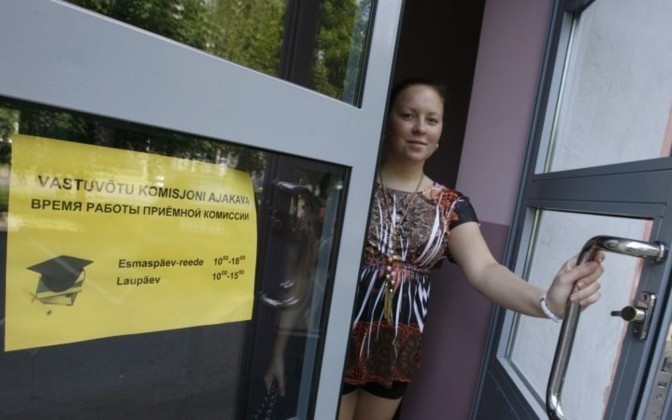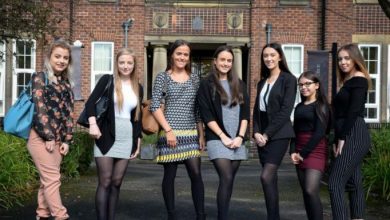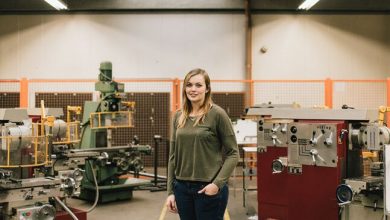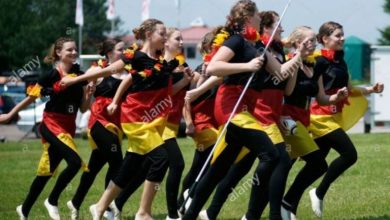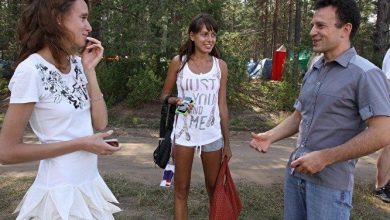ECOMEN: Managers for Europe
This year is unusual for the Institute of Economics and Management ECOMEN – the university is 15 years old. Today in this university there are more than a thousand students, about the same number of graduates were in 15 years. The Institute is preparing to receive guests from nine EU countries – EU higher education specialists will visit ECOMEN to study the experience of training managers for the pan-European labor market.
Professor Hanon Barabaner
In the current momentous period in the biography of the university, he was subjected to the control of three very serious structures. Firstly, ECOMEN has passed the relevant test and received a certificate of quality in accordance with ISO 9000: 2000. As a rule, according to this system, the multinational company VERITAS carries out certification of industrial enterprises, and one of the first higher educational institutions of the Republic of Estonia received an international ISO certificate. In fact, the university passed the international exam to verify the success of the management of the educational process.
Secondly, the institute passed international accreditation – the ECOMEN activity was checked by a commission of representatives from the UK, Sweden, Denmark and Finland. Conclusion – the institute’s curricula comply with European requirements and standards. The Commission also noted a very positive factor in the development of ECOMEN – the emergence of such specializations in the labor market of Estonia and Europe as construction management, energy and utilities, as well as logistics.
The International Commission also noted the level of professional content of the university library. According to the committee, the educational literature published by ECOMEN is useful not only in Estonia, but also in other countries. The fact is that the publications of this university show the experience of economic transformations in the European Union, in particular, in the new states that have joined the EU economic system in recent years.
The third new moment this year, which has become another milestone in the fate of the institute, is connected with the assessment given to the university by a council formed from authoritative representatives of the Estonian educational sphere. A government-appointed council called for full accreditation for seven years of ECOMEN training programs. This assessment gives confidence to the work of the Institute of Economics and Management, headed by Professor Hanon Barabaner, who has chosen a creed – a 21st century specialist should be humanistically educated, economically efficient and environmentally educated. Note that the rector of the Institute of Economics and Management, Hanon Barabaner, is an honorary professor at the International Academy of Tourism, an honorary doctor of the Petersburg State Engineering and Economic University INZHECOM (among the honorary doctors of this famous university, in particular, such well-known managers as the head of RAO UES of Russia Anatoly Chubais and CEO of Severstal Group Alexey Mordashov). The Rector of ECOMEN is also an academician of the International Academy of Biosphere Sciences (recognition of merit in research in the field of energy and ecology). Let’s also say that Nursultan Nazarbayev invited Hanon Drummer to join the Club of Eurasian Scientists, created under the patronage of the President of Kazakhstan.
The institute has two main equal branches – in Tallinn and Sillamae, and there are also training consulting centers in Narva and Kohtla-Järve. In fact, in the sphere of influence of the university, it is not only the capital, but also the cities of the north-eastern industrial region.
At a recent major international conference held in Riga and dedicated to the Bologna process – the formation of a single European educational space, the experience of the Estonian ECOMEN was regarded as very positive, having value for the educational system of Estonia and the EU as a whole. The fact is that Estonia has retained a university where studies are conducted entirely in Russian. At the same time, students study Estonian at this university as a compulsory discipline and as a specialized language necessary in a particular field.
New diploma – new goals
63 graduates who studied in the northeastern branches of the Institute of Economics and Management ECOMEN were awarded diplomas. This is the largest graduation in the 15 years of the institute’s activity, the forerunner of which was the International College of Ecology and Technology, registered and opened in Sillamae on June 21, 1993. And the Tallinn branch of ECOMEN now has 50 graduates.
Graduation ceremony for students in Ida-Virumaa was held at the Sillamae Culture Center. Moreover, eight newly minted specialists also received diplomas of the St. Petersburg Engineering and Economic University INZHEKON. Prof. Hanon Barabaner, Rector of the ECOMEN Institute, Professor Nikolai Bondarenko, Consul General of Russia in Narva, Elena Korshunova, Chairman of the Sillamae City Council and Yuri Kollo, Vice-Mayor of Kohtla-Järve, congratulated specialists in the fields of production, construction, energy management, environmental protection and other areas of the economy. Among the graduates – 12 residents of Sillamae, 29 Narvites and 22 representatives of Kohtla-Järve and Johvi.
Graduates are waiting for industrial enterprises, the banking sector, specializing in cargo transportation companies.
And, of course, in the energy sector. Today, this industry is becoming a priority for almost all countries. The more reliable the country’s energy sources, the more its political and state sovereignty is ensured. Estonia was rewarded with a fate rather serious, though not a very simple resource – oil shales.
From a conversation with the rector of the university, a definite conclusion can be made – shale energy, whose base enterprises are concentrated in Narva, has a future. Successfully upgraded
On the 8th and 11th blocks of the Narva power plants, this suggests that a successful scheme for the energy use of oil shale was found – a new technology for burning fuel in a fluidized bed. The innovation meets the requirements of the European Union to reduce the negative environmental impacts of thermal power plants. The new technology can be successfully applied in the modernization of other power units.
Shale oil is in great demand on the European market – the result of the processing of “combustible stone” at a plant with a solid coolant at an Estonian power plant. As you can see, oil shale is the product that can compete with oil.
The scientist emphasizes that essentially today in the world revives interest in the chemical processing of oil shale. “I know a fairly large number of oil shale processing specialists who have left Estonia, who work in America, Australia, and Israel. These countries are beginning to actively return to developing their shales. ” Moreover, the United States has again restored the shale program at the state level, which at one time went into oblivion when oil was cheap enough.
At the first International Shale Congress, held in Estonia in the 1970s, shale was called second-tier fuel. The first echelon – oil and gas – to some extent running out, is becoming very expensive. In this situation, second-tier fuel comes to the fore. Coal and shale are again in demand. Despite the brain drain, Estonia has preserved the backbone of specialists, it has a very large backlog – the processing of this type of fuel and raw materials in the ER was and remains theoretically and practically in first place in the world. That is where the prospects are.
ECOMEN: 15 years through thorns to education in Russian
The Institute of Economics and Management ECOMEN is 15 years old. In this regard, the photo exhibition was inaugurated yesterday in the Institute building. Those who came with a significant date were congratulated by the rector of the institute, Hanon Drum.
Hanon Drum: “This exhibition will not end, and similar events will continue to be held”
The exhibition of photographs reflecting what is happening at the institute laid the foundation for the creation of a photo story of the institution. The pictures show the educational institution at different times and from different angles, outstanding students and just pleasant and memorable moments from the life of the institute. According to Hanon Drum, this exhibition will not end, and similar events will continue in the future. A special archive photo album will be created. Materials for the exhibition were taken both from the institute’s archive, and teachers and students shared their pictures.
At the exhibition presentation, the rector of the institute delivered a solemn speech. He noted that exactly 15 years ago on the same day, October 6, 1993, the first lecture was held at the International Ecological and Technological College, which is the progenitor of the Institute of Economics and Management. ”
Among the gathered there were also honored guests. In addition to the rector, Academician of the Academy of Sciences of Estonia Mikhail Bronstein also took the floor. He emphasized some economic and social problems and emphasized: “The Russian-speaking population in Estonia is in a difficult situation. You must either be professional, or go to the bottom. There is no other way. ”
It is worth noting that the Institute of Economics and Management ECOMEN is currently the only institution of higher education in Estonia that has received full accreditation of instruction in Russian. As Vyacheslav Ivanov, head of the Institute’s mass communications department, said, “Estonian applicants have a very wide choice and more options than Russians. And the university was created in the North-East of Estonia, where many Russians live. There were no other options, and applicants had to go to Tartu or Tallinn, where training is mainly in Estonian. Therefore, the main priority of the university is to enable Russian-speaking students to receive education in their native language. ”
The structure of the institute is structured so that one part of it is located in Sillamae, and the other in Tallinn. Between branches in these cities a telecommunication channel was conducted. Online teachers can give lectures broadcast from one city to another.
In addition to the past photo exhibition, other events are planned at the institute, dedicated to the anniversary year. Soon, Tallinn Institute of Business Days will be held in the building of the institute. Also, on October 28, within the framework of the ECOMEN Institute, a conference in Russian will be held on the issues and problems of higher education. Representatives of other higher educational institutions and foreign guests will be involved. At the end of November, a conference on global economic issues will be organized by the Russian Academic Society with the participation of ECOMEN. On top of that, the seventh anniversary collection entitled “15 years for the good of Estonia” is published.
Captured Moments. Event afterword
With such a small but capacious speech, the text of which you see on this newspaper page, Academician Mikhail Lazarevich Bronstein spoke at the opening of the exhibition, which marked the beginning of a whole series of events dedicated to the 15th anniversary of the Institute of Economics and Management. And it was necessary to hear these thunderous applause when the rector of the institute, Professor Drummer and Academician Bronstein cut the ribbon, symbolically marking the entrance to the history of the university, reflected in numerous photographs. These pictures, enclosed in strict but elegant frames, seemed to stop different moments from the life of the institute. Graduation ceremony. Laughing young people at the international fair of educational institutions, the institute always takes part in such exhibitions-fairs. Or here are pictures from the international tourism exhibition “Uterus-2008” in Helsinki.
But there was not and could not be among these bright, colorful photographs of the one that would have been taken in the early 90s in a small room on Vana Posti, where two old, creaky writing tables were hardly placed. In this shabby little room, where two amazing people were sitting, the future rector of the institute and his deputy, the idea of creating the institute, which seemed absolutely unbelievable in those days, was born. It was the 93rd year. The atmosphere in society, in the power structures of Estonia was, to put it mildly, far from the best for the Russian-speaking population, everything was possible then in the country, right up to a clash of people of different nationalities. It is not for nothing that Professor Drummer, recalling those times and how much effort had to be applied to open this Russian-language educational institution, said bitterly: “Someone really wanted our young men to become“ stall boys ”, and girls – “panel girls.” I still remember how one of the famous politicians cynically said back then, not at all embarrassed: “We will need hard workers.”
One had to believe very much that Russian education would be necessary in this country, that it would be in demand in order to take on such a large, complex and responsible business – the creation of an institute.
By the way, at the opening of the exhibition, the rector Professor Drummer showed the audience the old newspaper issue, published in the early 90’s, with the article “Cambridge in Sillamae”. And it was strange to see this newspaper page, yellowed with time, frayed on the folds. It even seemed to me that the students looked at this old newspaper issue with some bewilderment. Perhaps many did not realize that between this long-standing issue of the newspaper and the current grand opening of the exhibition there were years of endless work, years of hope and doubt, despair and faith. And amazing stubbornness.
But I must say that even then, at that difficult time, there were still people who soberly assessed the situation, tried to look ahead, on top of, so to speak, momentary political ambitions, on top of all the outbursts of nationalism, etc. The decision to support the creation of a Russian college in the Northeast, from which the institute later grew, was taken by the government commission on Ida-Virumaa, which then included such famous people as Maryu Lauristin, Andres Tarand, etc. And on the Russian side, the idea of creating a college was supported by the chairman of the Committee on Higher Education of Russia, the Council of Rectors of St. Petersburg.
By the way, and then there were people, smart, sane people who, in spite of everything, supported the institute even in the most difficult times. It was not for nothing that Elder Pykhya-Tallinn Enno Tamm and his deputy, Yuri Jõgeva, attended the opening of the exhibition, which tells about the history of the institute. ECOMEN managers speak of them with unchanging gratitude.
But astounding. The institute and then, when it seemed to be already firmly building on its feet, was favorably evaluated by international experts, had to experience many bitter, unpleasant moments. Especially difficult, as the rector and his deputy Lyudmila Barabaner recall, the year 2003 was seemingly quite calm. And, as Professor Drummer put it, “bandits flew into the institute,” it sounds strange in our enlightened, civilized age, isn’t it? And yet.
For more than a month, commissions from the Tax Department sat in the institute, looking for and not finding any violations, but unnerving employees and management.
The institute passed six examinations upon receipt of licenses. One expert refuted what the other praised. Sometimes I wanted to put together all these results of examinations so that it immediately became clear how they were trying to create an intolerable atmosphere for the institute. And it was necessary to live and work in full force so that none of the students would even feel the difficulties that the institute was experiencing.
I will never forget one of the first “initiations into students”, somewhere in the mid-90s, a funny, unusual, but expressive ritual. I remember the sheets of waxed paper from which the students had to fold the cups and then drink the mysterious liquid from them. In fact, it turned out to be salt water. As a hint that during the years of study you will have to eat more than one pound of salt. I remember how, dipping a finger in ink, the guys solemnly applied it to a huge scroll of paper. Signed under the text of the institute oath. There has always been a lot of laughter, fun fiction, incredible ingenuity.
I remember something like a kind of anthem that students and teachers sang: “In a dark blue courtyard, in a corner of Tuulemiäe, far from trams and the noise of the crowd, we erected a college and gathered students …” The institute was then in close, little adapted for the present educational institution premises. But they studied. And how they studied!
And then a building appeared on Erica 7a. It also went to the institute with great difficulty. But my God, what kind of building it was. Blackened walls, charred beams, broken glass, sunken floors. And piles, piles of garbage everywhere. Perhaps only the rector and his deputy, these two amazing people, could see in this terrible ruin, in this monstrous chaos of destruction, a bright image of the future institution.
European experts, heads of the largest European universities, who checked the institute, its excellent material base, its curriculum for accreditation, probably didn’t even think “from what rubbish”, how poems grow, and this educational institution grew up. And if they knew, probably would have been shocked. It is unlikely that anyone in a prosperous Europe could have done something similar.
But the Institute has twice in the years of its work received full international accreditation of its programs. Furthermore. On one of the institute’s walls, not far from these very pictures telling about its history, there is a certificate of the largest international organization operating in almost 200 countries of the world – Bureau Veritas Certification. As evidence of the high level of this institution.
At the opening of the exhibition, the rector was businesslike and energetic, as always. And only those who worked with him for many years saw how he was worried. And how was it not to worry, remembering past years? Once the institute, then still a college, began with 70 students. Now more than 1000 people study here. The Institute lives, grows. And God give him bon voyage.
In fact, the age of enlightenment will not end as long as it is alive, as long as there are enlighteners.
This post is also available in:
 English
English  Русский (Russian)
Русский (Russian)

